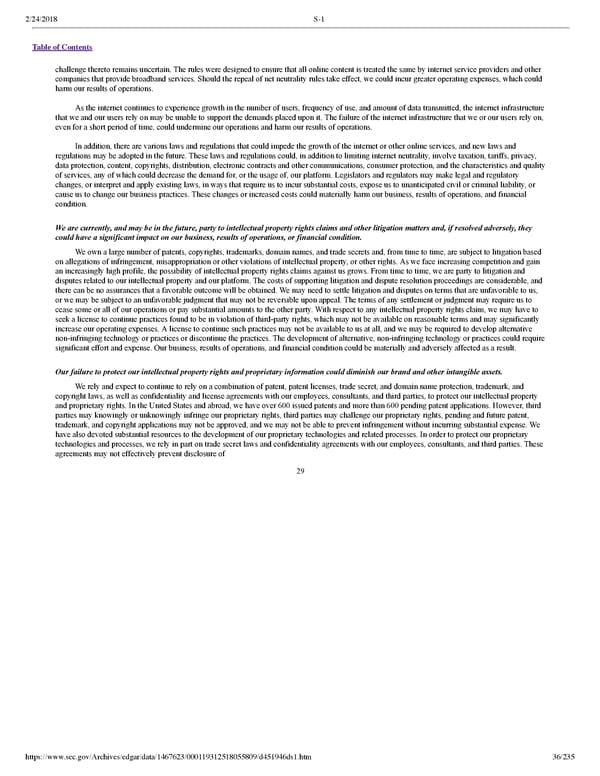2/24/2018 S-1 Table of Contents challenge thereto remains uncertain. The rules were designed to ensure that all online content is treated the same by internet service providers and other companies that provide broadband services. Should the repeal of net neutrality rules take effect, we could incur greater operating expenses, which could harm our results of operations. As the internet continues to experience growth in the number of users, frequency of use, and amount of data transmitted, the internet infrastructure that we and our users rely on may be unable to support the demands placed upon it. The failure of the internet infrastructure that we or our users rely on, even for a short period of time, could undermine our operations and harm our results of operations. In addition, there are various laws and regulations that could impede the growth of the internet or other online services, and new laws and regulations may be adopted in the future. These laws and regulations could, in addition to limiting internet neutrality, involve taxation, tariffs, privacy, data protection, content, copyrights, distribution, electronic contracts and other communications, consumer protection, and the characteristics and quality of services, any of which could decrease the demand for, or the usage of, our platform. Legislators and regulators may make legal and regulatory changes, or interpret and apply existing laws, in ways that require us to incur substantial costs, expose us to unanticipated civil or criminal liability, or cause us to change our business practices. These changes or increased costs could materially harm our business, results of operations, and financial condition. We are currently, and may be in the future, party to intellectual property rights claims and other litigation matters and, if resolved adversely, they could have a significant impact on our business, results of operations, or financial condition. We own a large number of patents, copyrights, trademarks, domain names, and trade secrets and, from time to time, are subject to litigation based on allegations of infringement, misappropriation or other violations of intellectual property, or other rights. As we face increasing competition and gain an increasingly high profile, the possibility of intellectual property rights claims against us grows. From time to time, we are party to litigation and disputes related to our intellectual property and our platform. The costs of supporting litigation and dispute resolution proceedings are considerable, and there can be no assurances that a favorable outcome will be obtained. We may need to settle litigation and disputes on terms that are unfavorable to us, or we may be subject to an unfavorable judgment that may not be reversible upon appeal. The terms of any settlement or judgment may require us to cease some or all of our operations or pay substantial amounts to the other party. With respect to any intellectual property rights claim, we may have to seek a license to continue practices found to be in violation of thirdparty rights, which may not be available on reasonable terms and may significantly increase our operating expenses. A license to continue such practices may not be available to us at all, and we may be required to develop alternative noninfringing technology or practices or discontinue the practices. The development of alternative, noninfringing technology or practices could require significant effort and expense. Our business, results of operations, and financial condition could be materially and adversely affected as a result. Our failure to protect our intellectual property rights and proprietary information could diminish our brand and other intangible assets. We rely and expect to continue to rely on a combination of patent, patent licenses, trade secret, and domain name protection, trademark, and copyright laws, as well as confidentiality and license agreements with our employees, consultants, and third parties, to protect our intellectual property and proprietary rights. In the United States and abroad, we have over 600 issued patents and more than 600 pending patent applications. However, third parties may knowingly or unknowingly infringe our proprietary rights, third parties may challenge our proprietary rights, pending and future patent, trademark, and copyright applications may not be approved, and we may not be able to prevent infringement without incurring substantial expense. We have also devoted substantial resources to the development of our proprietary technologies and related processes. In order to protect our proprietary technologies and processes, we rely in part on trade secret laws and confidentiality agreements with our employees, consultants, and third parties. These agreements may not effectively prevent disclosure of 29 https://www.sec.gov/Archives/edgar/data/1467623/000119312518055809/d451946ds1.htm 36/235
 Dropbox S-1 | Interactive Prospectus Page 35 Page 37
Dropbox S-1 | Interactive Prospectus Page 35 Page 37